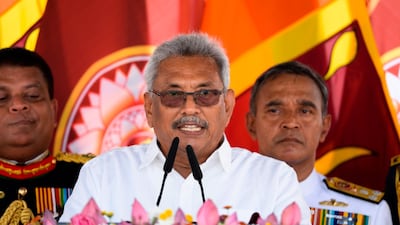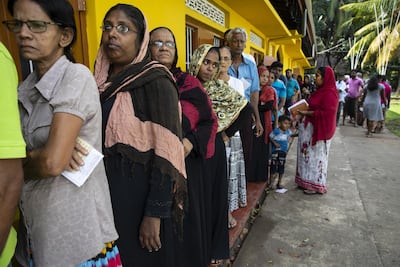Sri Lanka’s presidential elections concluded this weekend with former wartime defence secretary Gotabaya Rajapaksa securing more than 52 per cent of the vote. As Sri Lanka’s new president, he has risen to the highest office in the island-state. While there has been jubilation in much of the Sinhala south, Tamils and Muslims across the north-east fear that the return of a Rajapaksa regime means further rights abuses.
As results were being announced late on Saturday, a familiar pattern was emerging, with politics split along ethnic lines, as has become the norm in Sri Lanka. In the largely Tamil north-east, voter turnout was the highest on record since presidential polls were first held in 1982. The United National Party's (UNP) Sajith Premadasa, Mr Rajapaksa's leading rival, had a resounding majority in those areas, garnering more than 80 per cent of the vote in Tamil areas and reducing Mr Rajapaksa's support to as little as 5 per cent in some districts.
The Sinhala south, however, showed markedly different results. Gotabaya Rajapaksa, who, like his older brother and former president Mahinda, espouses a particularly virulent form of nationalist politics and ran a campaign on a hardcore Sinhala nationalist platform, secured much of the Sinhala heartland. He reiterated his commitment to Sri Lanka's "unitary" nature – a nod to his party's resistance to devolution of powers to the island's Tamil provinces. He also vowed to protect Sri Lankan soldiers accused of war crimes, with his manifesto stating he would free those accused of rights abuses and end "foreign interference" on the island.
In the wake of the Easter Sunday attacks that claimed 269 lives earlier this year, his pledge to bolster the already massive Sri Lankan military also had particular appeal. Mr Rajapaksa repeatedly pointed to the current government's failure to prevent the attacks to cement support for his national security agenda. With a Sri Lankan parliamentary select committee report raising the possibility that security forces might have allowed the attack to proceed in order to "create chaos and instil fear" ahead of presidential elections, Mr Rajapaksa's strongman approach ensured he won widespread support.
Although Mr Premadasa had attempted to echo his rival’s nationalist agenda, he was unable to match him. Mr Premadasa, an avowed Sinhala Buddhist nationalist, also pledged to protect those accused of war crimes and enhance the military. Yet his attempts to outbid Mr Rajapaksa failed to stick with the Sinhala electorate. Indeed, just days before the polls, news articles began surfacing in Sri Lankan media, suggesting that Mr Premadasa had made concessions to Tamil political parties. Although the stories were debunked and dismissed as fake, the campaign to paint him as less of a Sinhala patriot than Mr Rajapaksa took firm hold in the south. Even traditional UNP strongholds such as the capital Colombo swung decisively towards Mr Rajapaksa as results rolled in throughout the night.
For many Tamils in the north-east, there was little tangible choice between the two candidates. Both had rejected the demands of Tamil political parties and both had dismissed calls for accountability and justice for atrocities committed during the lengthy civil war, which claimed more than 100,000 lives. Although there were calls for a boycott of the election from some quarters, fears of the previous regime's brutal rule drove a record turnout, the majority voting overwhelmingly against Mr Rajapaksa. Despite this, Sri Lanka's electoral system is structured in a way that gives the north-east little influence and the election was won in the south.
For communities such as Tamils and Muslims, there is now an overwhelming sense of fear and trepidation. Mr Rajapaksa, who is likely to appoint his brother Mahinda as prime minister, has a proven and ruthless track record. As defence secretary during Sri Lanka’s 2009 military offensive against the Liberation Tigers of Tamil Eelam (LTTE), he was emphatic in his defence of the bombing of hospitals, arguing that they were legitimate targets, contrary to international law. He has been named in several UN reports as overseeing military operations and human rights abuses that culminated in tens of thousands of civilian deaths, including the shelling of government-declared no-fire zones. His tenure also saw the repression of free speech, the assassination of dozens of journalists and abductions using notorious unmarked white vans and carried out with total impunity. His rule was not just dangerous, it was deadly.
For Muslims, his close ties and deference to Buddhist extremists such as the Bodu Bala Sena (BBS) – an organisation that flourished under Mr Rajapaksa and whose name means "Buddhist power force" – will also raise serious concern. Their firebrand Sinhala nationalism has seen a revival in recent years, with the harassment of Muslims on the rise. The 2014 mob attacks by BBS members on Muslim businesses and homes in the coastal towns of Aluthgama and Beruwala, flashes of which were also seen earlier this year, will leave many fearful for their safety. Just this weekend, a bus carrying displaced Muslims who were on their way to vote was attacked by gunmen – a troubling sign of the climate of impunity that continues to reign.
Mr Rajapaksa too, has decided to immediately double down on his nationalist message post-victory. His swearing-in ceremony today was full of Buddhist religious overtones and was held in the town of Anuradhapura, by the site of a statue dedicated to the ancient Sinhala king Dutugemenu, a mythical figure that Mahinda Rajapaksa styled himself on after the defeat of the LTTE in 2009. The statue depicts his victory over the Tamil king Ellalan and subsequent rule over the island under a single kingdom. Flanked by Buddhist monks, the symbolism behind the new president’s first day in office leaves little ambiguity over how he intends to go on.
Indeed, Mr Rajapaksa’s victory highlights the failure of the current government to enact tangible progress on issues that remain core to the island’s enduring ethnic politics. A decade on from the end of the armed conflict, there is still no accountability for the massacres, no devolution of power and Sinhala nationalism remains as rampant as ever.
As Mr Rajapaksa begins his five-year term, there has been increased speculation that his older brother Mahinda, who is now constitutionally prevented from becoming president once more, could be installed as prime minister. A constitutional crisis last year saw him briefly occupy that position, and with Mr Rajapaksa now president, the path seems to have been cleared for him to take up the role.
Other members of the Rajapaksa clan, who also held senior cabinet roles under previous regimes, including brothers Basil and Chamal, as well as Mahinda's son Namal, also featured heavily in the presidential campaign. They all now stand poised to be appointed key government positions. With the Rajapaksas firmly back in power at the highest levels of the Sri Lankan state, a familiar fear has returned to the north-east.
Thusiyan Nandakumar is a member of the editorial board of the London-based Tamil Guardian


